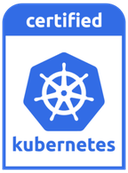Typhoon  ¶
¶
Typhoon is a minimal and free Kubernetes distribution.
- Minimal, stable base Kubernetes distribution
- Declarative infrastructure and configuration
- Free (freedom and cost) and privacy-respecting
- Practical for labs, datacenters, and clouds
Typhoon distributes upstream Kubernetes, architectural conventions, and cluster addons, much like a GNU/Linux distribution provides the Linux kernel and userspace components.
Features  ¶
¶
- Kubernetes v1.34.2 (upstream)
- Single or multi-master, Cilium or flannel networking
- On-cluster etcd with TLS, RBAC-enabled, network policy, SELinux enforcing
- Advanced features like worker pools, preemptible workers, and snippets customization
- Ready for Ingress, Prometheus, Grafana, CSI, or other addons
Modules¶
Typhoon provides a Terraform Module for defining a Kubernetes cluster on each supported operating system and platform.
Typhoon is available for Fedora CoreOS.
| Platform | Operating System | Terraform Module | Status |
|---|---|---|---|
| AWS | Fedora CoreOS | aws/fedora-coreos/kubernetes | stable |
| Azure | Fedora CoreOS | azure/fedora-coreos/kubernetes | alpha |
| Bare-Metal | Fedora CoreOS | bare-metal/fedora-coreos/kubernetes | stable |
| DigitalOcean | Fedora CoreOS | digital-ocean/fedora-coreos/kubernetes | beta |
| Google Cloud | Fedora CoreOS | google-cloud/fedora-coreos/kubernetes | stable |
| Platform | Operating System | Terraform Module | Status |
|---|---|---|---|
| AWS | Fedora CoreOS (ARM64) | aws/fedora-coreos/kubernetes | alpha |
Typhoon is available for Flatcar Linux.
| Platform | Operating System | Terraform Module | Status |
|---|---|---|---|
| AWS | Flatcar Linux | aws/flatcar-linux/kubernetes | stable |
| Azure | Flatcar Linux | azure/flatcar-linux/kubernetes | alpha |
| Bare-Metal | Flatcar Linux | bare-metal/flatcar-linux/kubernetes | stable |
| DigitalOcean | Flatcar Linux | digital-ocean/flatcar-linux/kubernetes | beta |
| Google Cloud | Flatcar Linux | google-cloud/flatcar-linux/kubernetes | stable |
| Platform | Operating System | Terraform Module | Status |
|---|---|---|---|
| AWS | Flatcar Linux (ARM64) | aws/flatcar-linux/kubernetes | alpha |
| Azure | Flatcar Linux (ARM64) | azure/flatcar-linux/kubernetes | alpha |
Typhoon also provides Terraform Modules for optionally managing individual components applied onto clusters.
| Name | Terraform Module | Status |
|---|---|---|
| CoreDNS | addons/coredns | beta |
| Cilium | addons/cilium | beta |
| flannel | addons/flannel | beta |
Documentation¶
- Architecture concepts and operating-systems
- Fedora CoreOS tutorials for AWS, Azure, Bare-Metal, DigitalOcean, and Google Cloud
- Flatcar Linux tutorials for AWS, Azure, Bare-Metal, DigitalOcean, and Google Cloud
Example¶
Define a Kubernetes cluster by using the Terraform module for your chosen platform and operating system. Here's a minimal example.
module "yavin" {
source = "git::https://github.com/poseidon/typhoon//google-cloud/fedora-coreos/kubernetes?ref=v1.34.2"
# Google Cloud
cluster_name = "yavin"
region = "us-central1"
dns_zone = "example.com"
dns_zone_name = "example-zone"
# configuration
ssh_authorized_key = "ssh-ed25519 AAAAB3Nz..."
# optional
worker_count = 2
}
# Obtain cluster kubeconfig
resource "local_file" "kubeconfig-yavin" {
content = module.yavin.kubeconfig-admin
filename = "/home/user/.kube/configs/yavin-config"
file_permission = "0600"
}
Initialize modules, plan the changes to be made, and apply the changes.
$ terraform init
$ terraform plan
Plan: 62 to add, 0 to change, 0 to destroy.
$ terraform apply
Apply complete! Resources: 62 added, 0 changed, 0 destroyed.
In 4-8 minutes (varies by platform), the cluster will be ready. This Google Cloud example creates a yavin.example.com DNS record to resolve to a network load balancer across controller nodes.
$ export KUBECONFIG=/home/user/.kube/configs/yavin-config
$ kubectl get nodes
NAME ROLES STATUS AGE VERSION
yavin-controller-0.c.example-com.internal <none> Ready 6m v1.34.2
yavin-worker-jrbf.c.example-com.internal <none> Ready 5m v1.34.2
yavin-worker-mzdm.c.example-com.internal <none> Ready 5m v1.34.2
List the pods.
$ kubectl get pods --all-namespaces
NAMESPACE NAME READY STATUS RESTARTS AGE
kube-system cilium-1cs8z 2/2 Running 0 6m
kube-system cilium-d1l5b 2/2 Running 0 6m
kube-system cilium-sp9ps 2/2 Running 0 6m
kube-system coredns-1187388186-dkh3o 1/1 Running 0 6m
kube-system coredns-1187388186-zj5dl 1/1 Running 0 6m
kube-system kube-apiserver-controller-0 1/1 Running 0 6m
kube-system kube-controller-manager-controller-0 1/1 Running 0 6m
kube-system kube-proxy-117v6 1/1 Running 0 6m
kube-system kube-proxy-9886n 1/1 Running 0 6m
kube-system kube-proxy-njn47 1/1 Running 0 6m
kube-system kube-scheduler-controller-0 1/1 Running 0 6m
Help¶
Schedule a meeting via Github Sponsors to discuss your use case.
Motivation¶
Typhoon powers the author's cloud and colocation clusters. The project has evolved through operational experience and Kubernetes changes. Typhoon is shared under a free license to allow others to use the work freely and contribute to its upkeep.
Typhoon addresses real world needs, which you may share. It is honest about limitations or areas that aren't mature yet. It avoids buzzword bingo and hype. It does not aim to be the one-solution-fits-all distro. An ecosystem of Kubernetes distributions is healthy.
Social Contract¶
Typhoon is not a product, trial, or free-tier. Typhoon does not offer support, services, or charge money. And Typhoon is independent of operating system or platform vendors.
Typhoon clusters will contain only free components. Cluster components will not collect data on users without their permission.
Sponsors¶
Poseidon's Github Sponsors support the infrastructure and operational costs of providing Typhoon.
If you'd like your company here, please contact dghubble at psdn.io.
